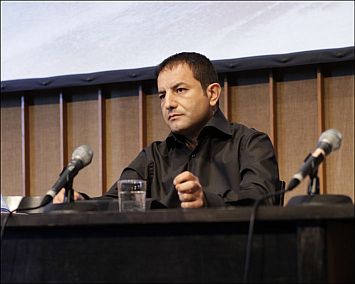
Amara Lakhous
Amara Lakhous was born in 1970 in Algiers, the sixth of nine children. His parents were Berbers, and they sent him to a Koran school for four years where he learned classical Arabic. He learned French at junior school, which meant that he had the role of mediating between his Algerian and his French relatives. He was influenced from an early age by authors like Mahfouz, Flaubert and Hemingway, and after finishing school decided to study at the Faculty for Philosophy in Algiers, where he also delved into the roots of his Algerian identity, religion, the civil war and systems of male superiority. He went on to work for Algerian radio, where, like many of his colleagues, he had to put up with repeated threats. »I was sick and tired of waiting for my murderers«, is how Lakhous explained his decision to leave Algeria. In 1995, with a manuscript in his luggage, he moved to Rome.
The manuscript, which he had written in Arabic when he was 23, was published four years later in a bilingual edition: »Le cimici e il pirata« (tr: The Bug and the Pirate) is about the 40-year-old Hassinu, a kind of imaginary pirate, who is incapable of enjoying his freedom. Lakhous earned a second degree at the University La Sapienza in Rome in Cultural Anthropology: his dissertation was on Muslim-Arab immigrants in Italy. His second book was published in Italy in 2006: »Scontro di civiltà per un ascensore a Piazza Vittorio« (2008, Engl: »Clash of Civilizations Over an Elevator in Piazza Vittorio«) is a revised version of his novel »Come farti allattare dalla lupa senza che ti morda«, which was released in 2003 in Algeria and Lebanon. The book tells with irony and precision the story of a murder in Rome, and with its descriptions of the idiosyncrasies of the people who have come from all over the world and now live there, it looks at the theme of identity in a multicultural environment: »I lived for six years on the Piazza Vittorio, it’s a kind of laboratory for the future, the prototype of intellectual cohabitation.« Lakhous doesn’t only use the unadulterated perspective of the immigrant to focus on the central issues which natives overlook. He also experiments with language by enriching his Italian prose with expressions, imagery and terms from his original language: »I Arabise the Italian and Italianise the Arabic.«
Amara Lakhous has been awarded, among others, the Premio Flaiano per la narrativa in 2006 and Algeria’s most prestigious literary award, the Premio dei librai algerini, in 2008. The author lives in Rome.
Le cimici e il pirata
Arlem
Rom, 1999
[Ü: Francesco Leggio]
Krach der Kulturen um einen
Fahrstuhl an der Piazza Vittorio
Wagenbach
Berlin, 2009
[Ü: Michaela Mersetzky]
Divorzio all’islamica a viale Marconi
Edizioni E/O
Rom, 2010
